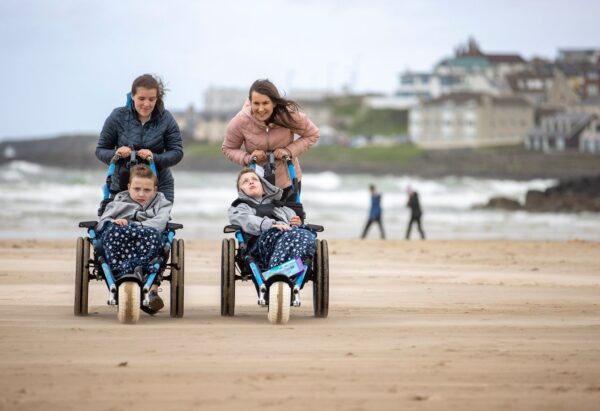Stewart was diagnosed with inclusion body myositis (IBM) at 66, after having a spinal disc unnecessarily removed from his neck. He talks about his long diagnosis journey, the lack of understanding of IBM in the NHS, and the accidents he’s had due to negligence.
“When I asked my GP for help, they said ‘I know nothing about your condition. You know more than me.”

Having unnecessary surgery
I started getting strange feelings in my hands in 2010, so I went to see my GP. After being referred to a specialist, they told me I had a protruding disk in my neck that was causing the problem and it needed to be removed. Getting surgery took several years, and in the end I paid privately, but still continued having the same problems. After going back to the consultant, he didn’t think the disk had been the problem and referred me for other tests.
Eventually, I had a muscle biopsy and received a letter one day through my door saying I had a type of muscular dystrophy called inclusion body myositis (IBM). This was six years after my symptoms had started.
I’d never heard of the condition, so I called my GP to get some information. The response I received was “Oh, that’s interesting. At least you know what it is now. I don’t know anything about it.” And that was that.
Finding support through Muscular Dystrophy UK
Shortly after, we saw that Muscular Dystrophy UK were holding an information day. My wife and I attended with the hope of finding out more about the condition as nobody seemed to be able to tell us anything.
“The day was the start of receiving the support we needed. I met a whole team of people in South Wales who look after people with IMB, and I was able to get a referral to one of the neurologists. ”
The fall that started it all
I’m a very positive person and like to push myself which is my biggest asset and my biggest enemy. My worst symptom is falling over a lot, but I continued to walk everywhere. I broke my kneecap in four places after a particularly bad fall. The hospital pinned and plated it, but the injury never healed.
I spent three years getting repeated abscesses and infections. A specialist recommended I have my leg amputated below the knee, but I couldn’t bear the thought of this and refused. By this point I could only walk with crutches and still fell over sometimes. I persevered for as long as possible, but it was making every part of my life difficult, and I felt awful.
Two and a half years ago I had an above the knee amputation. It was difficult to learn to walk again but I’m fortunate I was able to do so with a prosthetic. Unfortunately, I had two additional falls due to other people’s negligence, which have resulted in breaking both my rotator cuffs and having to use an electric wheelchair almost all the time now.
“My condition has got worse from others’ mistakes”
I broke one of my shoulders before having my leg amputated. A cleaner had dripped water on the floor and hadn’t put down a wet floor sign. My crutches flew into the air and I smashed my shoulder when I fell.
A little while after my amputation, I was on a bus in my electric wheelchair, and the driver went so fast round a corner that my chair tipped over sideways with me in it and I broke my other shoulder! He didn’t even realise what had happened; the other passengers shouted to him to pull over while several people tried to lift me up.
Both of these accidents mean I’m now only able to get around the house in my wheelchair and have to use an outdoor electric wheelchair outside the house – my injuries mean I cannot use my crutches any more. One of my shoulder’s has been repaired and I’m on the waiting list to have surgery on the other.
“But it’s not about whether they can be fixed, it’s about the pain and stress that both these avoidable situations have caused.”
Looking forward
Another challenge of IBM is the effect it can have on your swallow. I’ve been seeing a speech and language therapist (SALT) for four years now and I’m hoping I’ll be offered an Esophageal Dilation soon which could help me eat more easily. I only know about this procedure because of a support group I’m part of. Similarly to the GP, my SALT doesn’t know how to help me, so they’re creating a multidisciplinary meeting to discuss my case.
I’m 74 now but still feel like I have a lot to offer. I’m involved in supporting several other charities and try to keep busy, but feeling like people don’t know how to help you takes its toll.


